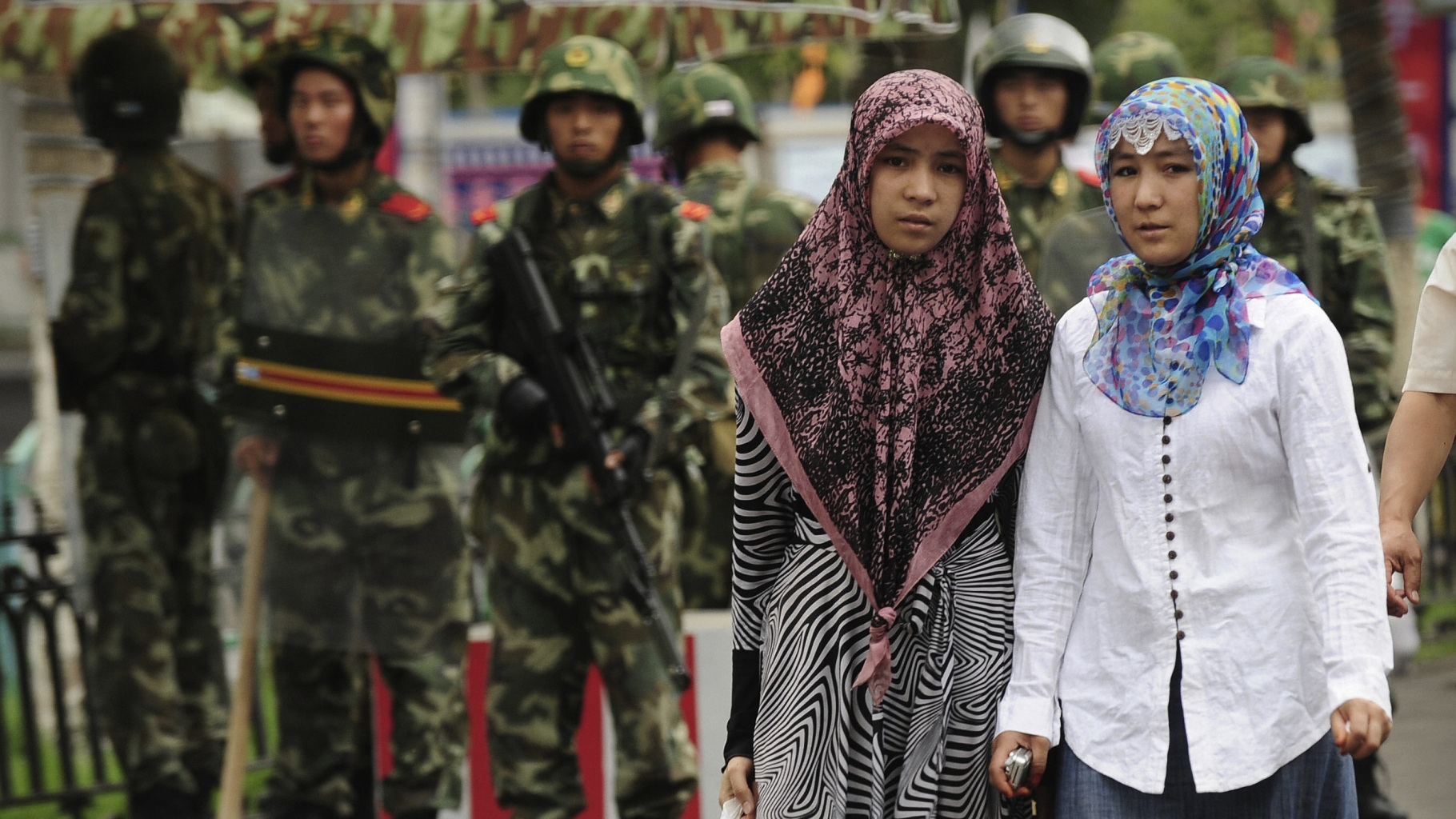Continued from the previous article: In August, a UN human rights panel reported that around 2 million Uyghurs and Muslim minorities have been forced into political indoctrination camps in Xinjiang Uyghur Autonomous Region, as part of a brutal crackdown. In this series, The Epoch Times delves into the persecution of the Uyghurs in China as they try to survive amid increasing surveillance and rights violations.
By Jocelyn Neo |
Mandarin Chinese as First Language
For many years, China had implemented a bilingual education system in Xinjiang’s schools where Uyghur students studied subjects taught in Uyghur language with Mandarin Chinese as the second language school subject. Uyghur-Chinese bilingual education has always been encouraged in Uyghur schools until recently.
On June 28, 2017, the education department in Xinjiang’s Hotan area issued a law banning the use of Uyghur in schools, effective last September.
According to Radio Free Asia (RFA), the directive stated that schools must “insist on fully popularising the national common language (Mandarin Chinese) and writing system according to law, and add the education of ethnic language under the bilingual education basic principle”. In addition, the schools were instructed to “prohibit the use of Uyghur language, writing, signs and pictures in the educational system and on campuses”.
Those who fail to carry out the new policy will be “severely punished” and four officials have confirmed the new policy to RFA.
An Uyghur official said: “All teaching will be conducted in Chinese, not Uyghur language, in the upcoming semester. Even the Uyghur textbooks will be replaced with Chinese textbooks from inland China. All teachers and students are required to only speak the Chinese language in school and in the education system.”
However, a Chinese official explained that the new policy was to “encourage” the learning of Mandarin Chinese.
“Education authorities decided to ban the use of the Uyghur language in order to create a favourable environment for minorities to study the national language,” he said.
However, observers who spoke to RFA said this violates China’s constitution and ethnic autonomy laws.
The constitution stipulates that “the people of all nationalities have the freedom to use and develop their own spoken and written languages” while the ethnic autonomy laws state that schools in ethnic places “use textbooks in their own languages and use these languages as the media of instruction”.
Obtaining Permission to Travel
Unlike other Chinese citizens, the Uyghurs are not allowed to travel freely, especially to Mecca for the Hajj pilgrimage.
An Uyghur photographer living in Beijing told the Chinese media that his mother was barred from going to Mecca because his sister teaches in a middle school.
In 2016, the CNN reported that millions of residents in Xinjiang have been told to hand in their passports to the police. Those who wish to travel abroad will need to seek permission from the authorities while those who refuse will not be allowed to leave the country.
The World Uyghur Congress, a Germany-based rights group, believes that the authorities are targeting the Uyghurs.
“Although the regulations ostensibly target all residents, Chinese authorities in the past have taken clear steps to limit mobility rights for the Uyghur community in particular,” the Congress said in a statement.
Not only are the Uyghurs unable to travel freely, those studying abroad were also forced to return home after the authorities threatened to imprison their families and pressured other governments to detain and deport the students.
And those who returned to China seemed to have disappeared and were uncontactable, VOA reported in 2017.
Gulgine Tashmemet, a young Uyghur woman who was studying abroad in the University of Technology in Malaysia, returned to Ghuljia (Yining) city in XUAR’s Ili Kazakh (Yili Hasake) Autonomous Prefecture in December 2017 after she lost contact with her parents.
“When she was in Malaysia she lost contact with the family completely … [so] she decided to go home to see her parents and her younger brother, as she was extremely worried about them,” said her Germany-based sister, Gulzire, to RFA. “I repeatedly told her not to return, but she didn’t listen. She said, ‘I must go and find out what is happening to our parents before I can restart my studies.’”
After losing contact with her sister, Gulzire “contacted a friend to seek more information” and was informed that her sister “had been taken for re-education, and immediately after messaging me, she deleted me from her WeChat contacts”.
Malaysia was one of the dozen of countries that the Chinese authorities believed has a risk of “extremist” Muslim indoctrination, Gulzire said, which led to her sister coming under greater scrutiny for studying there.
Gulgine went through a “full investigation” in March 2017 when she returned home during the spring vacation.
“A blood sample was taken for the DNA database, and she was made to provide a copy of her passport and other requested documents, along with a letter of promise stating that she would return on the completion of her studies,” Gulzire said. “She said at the time that the political climate was extremely tense, and that she was only allowed to leave the country after signing the pledge to return.”
A rising 19-year-old Uyghur star football player was also not spared.
Erfan Hezim, a former member of the Chinese Super League, was detained in “political re-education camp” for “visiting foreign countries” as part of his training and for matches. An official from the Dorbijin Police Central Command said that Hezim was also detained previously for visiting foreign countries.
In 2016, a then 15-year-old boy named Yaqupjan Naman travelled to Turkey with his friends as a tourist, a decision that his father objected due to the authorities seeing such overseas trips as suspicious and religious “extremism”.
In an attempt to avoid the authorities’ attention, his father quickly brought him back home, but the police has already blacklisted Naman. He was soon arrested and detained at one of the camps.
Naman from Yekshenbe Bazar township, in Kashgar’s Yopurgha (Yuepuhu) county, then died in the camp at the age of 17. The police did not provide the cause of death to his family. Instead, they were forced to bury his body under the watchful eyes of the police.
According to RFA, a security chief of No. 2 Village in Bayanday Township in Ili Kazakh’s Ghulja (Yining) county said that almost 30 residents were detained for “wanting to travel abroad”.
Dilshat Rexit, a spokesman for the World Uyghur Congress, told Deutsche Welle that “the Chinese government is worried that Uyghurs, after returning from travel abroad, will have a better understanding of their condition and have a stronger will to oppose the government”.
“The limitation on passports shows the government lacks any confidence when its rule in Xinjiang is threatened,” Rexit added.
Heavy Labour for Uyghur Women and Children
For another group of Uyghurs—women and children left behind after men in their families were detained—it is not easy to survive without any income.
“Many families with two or three young children, having lost male labourers to re-education camps in the last six months, are facing financial difficulties at home,” said an officer from the Manglay police station, in Hotan’s Qaraqash (Moyu) county, who spoke on condition of anonymity.
“To resolve this problem, the township government organised women and children to go to Aksu prefecture to pick cotton [and take on other heavy labour jobs].”
And such physical work are also taken on by pregnant women and the elderly, a manager of female labourers in Purchaqchi township revealed.
“In the past, when we had men working, we didn’t have to take on so much, but this year, we women are exhausted with the heavy labour we have to endure,” she said.
“We had to transport manure by motorcycle to the fields. If the men were here, they would have transported it by handcart and truck … We also had to pick the corn before cutting down the stalks and clearing the fields, when we previously only picked the corn and the men did the rest of the work.”
“In some families, there are pregnant women left on their own who must carry out the men’s tasks, as they have no other option,” she added.
And for Uyghur children whose parents or guardians have been detained in the camps, they will be sent to orphanages that are in “terrible” conditions due to overcrowding.
An Uyghur worker at a regional orphanage told RFA on condition of anonymity that “because there are so many children, they are locked up like farm animals in a shed”.
“We receive a lot of cash donations from the public, but only very little is spent on the children,” he said.
He added that some of the money was used to decorate several rooms and also to “dress up” some of the children for TV advertisements. To save money, the orphanage would give the children meat only once a week.
Unemployment
While Xinjiang has developed, the Uyghurs are still in poverty due to unemployment.
Iiham Tohti, a former economics professor at Beijing’s Central Nationalities University who is now serving a life sentence, told RFA in 2009 that “unemployment has existed in Xinjiang since the 1950s” and “unemployment among Uyghurs is among the highest in the world”.
Pointing out that 1.2 million workers have migrated to Xinjiang, Tohti noted: “[This] indicates that there are abundant employment opportunities in Xinjiang, but why are these opportunities not for Uyghurs?”
“I don’t oppose migration [to Xinjiang], but we need to re-evaluate it. Xinjiang doesn’t need migrants the way it needed them in the 1950s and 60s, so why bring in migrant workers? If there’s really no unemployment in Xinjiang, why transfer young Uyghur women to inland China as cheap labour?” he added.
To be continued
















